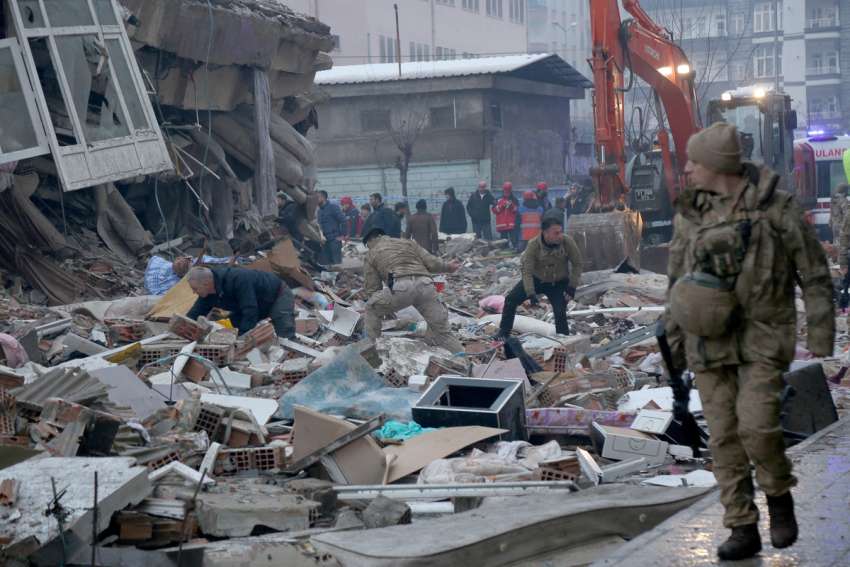The earthquake struck southern Turkey’s Gaziantep and Kahramanmaras provinces and northwestern Syria as many still sleeping were awakened and rushed outside to escape the devastation.
As of this report, over 2,800 people are dead in both countries. However, the death toll was expected to rise as rescue workers scrambled to save many trapped underneath fallen rubble.
Turkish residents posted videos of buildings continuing to collapse in the wake of deadly aftershocks. Gaziantep Castle, an ancient castle built over 2,000 years ago, was severely damaged in the wake.
Pope Francis sent a telegram to the victims of the earthquake in Turkey and Syria, addressed to the papal nuncios in both countries. The pope said he was "deeply saddened to learn of the huge loss of life caused by the earthquake." He assured the victims of "his spiritual closeness to all those affected," and sent heartfelt condolences "to those who mourn their loss."
In a message to Cardinal Mario Zenari, apostolic nuncio in Syria, Pope Francis said he "prays in particular for the emergency personnel involved in the ongoing relief efforts." Both telegrams to the nuncios were signed on behalf of the pope by Cardinal Pietro Parolin as Vtaican secretary of state.
In a statement released on his official Twitter account, Turkish President Recep Tayyip Erdogan said the government was mobilizing relief efforts in the southern region and expressed his hope "that we will overcome this disaster together in the shortest time and with the least amount of damage."
"I convey my well-wishes to all our citizens affected in Kahramanmaras by the earthquake, which was also felt in many parts of our country," he said.
As reported by The Associated Press, in the Turkish city of Adana, one survivor could be heard calling from beneath the rubble: "I don't have strength anymore."
In Syria, the Syrian Civil Defense -- a humanitarian organization commonly known as The White Helmets -- said via Twitter, "the toll may increase as many families are still trapped. Our teams are on the ground searching for survivors & removing the dead from the rubble.” As of 8:30 a.m. Eastern, more than 500 in Syria were reported dead.
The quake was felt as far as Cairo and woke people up in Beirut and in Damascus, Syria. In Syria, it hit the region divided between government-held territory and Syria's last enclave held by the opposition forces. Those also affected by the quake are refugees that escaped the conflict in Syria to Turkey.
In a Feb. 6 telephone interview with OSV News, Giulia Longo, program manager of Caritas Turkey and director of the Catholic charitable organization’s office in Anatolia, said the earthquake devastated the agency’s diocesan offices in Iskanderun.
"Our diocese has been destroyed, the diocesan office has been damaged beyond repair, the church is no longer there," Longo told OSV News.
"Therefore, the services that we offered no longer function. We are still in contact with people. The facilitators of the community are alive, (however) some of our benefactors have died."
Longo, who has worked in Turkey for the past four years, was in Italy at the time of the earthquake and is now working to coordinate relief efforts with Caritas Internationalis and its affiliates.
"Tomorrow morning (Feb. 7) we have an official meeting with the confederations of Caritas to understand how to coordinate all the help that will arrive," she said. "And today, we are dedicating ourselves to the assessment (of the situation) and to mourning, because this is a day of mourning."
Longo told OSV News that although Caritas Turkey has provided humanitarian relief in the country, including during the devastating earthquake that struck Izmir in 2020, the destruction of Caritas offices in the country makes relief efforts very difficult.
Nevertheless, she said she was struck by "feeling very much loved and part of a group of people who have the desire to rise up again."
"It is very strange that there is never time to suffer, there is only time to get working again," Longo said.
"There will be a time to speak about what has happened, but at the moment, we are still in an adrenaline-filled moment; (we are) trying to understand what we should do and how best to do it."


